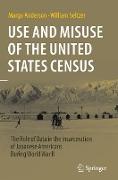Use and Misuse of the United States Census
BücherAngebote / Angebote:
The U.S. government counts the American population every 10 years, and uses the resulting numbers in formulas to allocate seats in the House of Representative and Electoral College, and to make public funding and policy decisions. It has served as an essential tool of representative democracy since 1790.
Americans have heeded the call to “stand up and be counted.” They also engage in an ongoing conversation to make sure that the information is used properly and ethically, that the census serves as a tool of representative democracy and advances the rights— including human rights—of all Americans.
Nevertheless, there have been misuses of census data and expertise. Today, as governments and social media are suspect for their exploitation of data about individuals, the experience of Americans of Japanese ancestry in the United States during World War II provides a chilling example of such misuse.
Federal officials mobilized the substantial administrative and technical resources of the 1940 census to map the neighborhoods where Japanese-Americans lived, and plan their systematic removal. They then built “census-like” data systems to track the “evacuees” for the duration of the war, monitor their lives in concentration camps, and certify which “loyal” evacuees might be released for military or civilian service during the war.
This book has lessons for policy makers and ordinary Americans alike. It speaks to two of the great issues of our time: distrust in the institutions of government and the victimization of minorities.
“This terrific book documents the most egregious but hidden use of Census data in US history, describes how the authors uncovered it, the Bureau’s reaction to their discovery, and considers its implications for Census and other government data collection.”
Andrew A. Beveridge, Co-founder and President of Social Explorer and Professor Emeritus of Sociology, Queens College, and Grad Center CUNY
Margo Anderson is Distinguished Professor Emerita [History & Urban Studies] at the University of Wisconsin - Milwaukee. She specializes in American social, urban and women’s history and has research interests in both urban history and the history of the social sciences and the development of statistical data systems, particularly the census.
William Seltzer held positions as an official statistician in the United States, abroad, and in international statistical agencies, including the U.S. Census Bureau, The Population Council, and the UN Statistics Division, where he was Chief of Demographic and Social Statistics (1974-86) and Director (1986-94). From 1995, until his retirement in 2011, he was a Senior Research Scholar at Fordham University.
Folgt in ca. 15 Arbeitstagen
